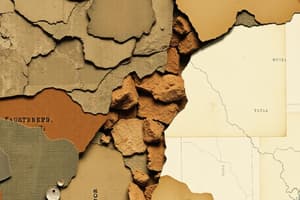Podcast
Questions and Answers
Which process involves minerals dissolving in water?
Which process involves minerals dissolving in water?
- Sedimentation
- Hydrolysis (correct)
- Oxidation
- Erosion
What two factors significantly impact the rate of weathering?
What two factors significantly impact the rate of weathering?
- Wind and temperature
- Soil type and animal activity
- Humidity and season
- Rock type and climate (correct)
Which statement best defines chemical weathering?
Which statement best defines chemical weathering?
- Decomposition due to human activities
- Weathering caused by biological factors
- Rocks being altered by chemical reactions (correct)
- Breaking down rocks without chemical changes
How is the weathering process caused by lichens classified?
How is the weathering process caused by lichens classified?
Which condition is most likely to result in slower chemical weathering?
Which condition is most likely to result in slower chemical weathering?
Which of the following represents a common result of oxidation in rocks?
Which of the following represents a common result of oxidation in rocks?
Which of the following situations is likely to promote rapid weathering?
Which of the following situations is likely to promote rapid weathering?
What type of weathering is primarily influenced by the action of roots from growing plants?
What type of weathering is primarily influenced by the action of roots from growing plants?
What purpose do pre-tests serve in the SLM?
What purpose do pre-tests serve in the SLM?
Which of the following is one of the expected outcomes after completing the module?
Which of the following is one of the expected outcomes after completing the module?
What should students avoid when using the SLM?
What should students avoid when using the SLM?
What assistance is recommended if students encounter difficulty with the SLM?
What assistance is recommended if students encounter difficulty with the SLM?
Which of the following best describes biological weathering?
Which of the following best describes biological weathering?
What is an essential step students should take before performing tasks in the module?
What is an essential step students should take before performing tasks in the module?
Why is it important for facilitators to use Notes to the Teacher?
Why is it important for facilitators to use Notes to the Teacher?
What is the role of answer keys provided in the module?
What is the role of answer keys provided in the module?
What primarily causes physical weathering of rocks?
What primarily causes physical weathering of rocks?
In which environment does freeze-thaw weathering predominantly occur?
In which environment does freeze-thaw weathering predominantly occur?
What is the main process involved in exfoliation weathering?
What is the main process involved in exfoliation weathering?
What role does water play in the freeze-thaw weathering process?
What role does water play in the freeze-thaw weathering process?
Which type of physical weathering is primarily related to the action of wind and gravity?
Which type of physical weathering is primarily related to the action of wind and gravity?
Where does physical weathering tend to occur most effectively?
Where does physical weathering tend to occur most effectively?
What happens to the water in the freeze-thaw process during the night?
What happens to the water in the freeze-thaw process during the night?
What is a typical characteristic of areas where exfoliation weathering occurs?
What is a typical characteristic of areas where exfoliation weathering occurs?
What is the primary driver of chemical weathering?
What is the primary driver of chemical weathering?
Which process results in the formation of new low-density minerals?
Which process results in the formation of new low-density minerals?
Which mineral is known to be chemically resistant and not affected by hydrolysis?
Which mineral is known to be chemically resistant and not affected by hydrolysis?
What type of chemical weathering involves the reaction of carbon dioxide with rainwater?
What type of chemical weathering involves the reaction of carbon dioxide with rainwater?
Which of the following processes is NOT a type of chemical weathering mentioned?
Which of the following processes is NOT a type of chemical weathering mentioned?
How does hydration affect the minerals in rocks?
How does hydration affect the minerals in rocks?
In which climate are chemical weathering processes likely to occur most rapidly?
In which climate are chemical weathering processes likely to occur most rapidly?
What is produced through the hydrolysis of feldspar?
What is produced through the hydrolysis of feldspar?
Which statement correctly describes the organization of the presentation?
Which statement correctly describes the organization of the presentation?
What aspect of the presenters' delivery is highlighted as being inconsistent?
What aspect of the presenters' delivery is highlighted as being inconsistent?
Which of the following statements related to preparation is NOT mentioned?
Which of the following statements related to preparation is NOT mentioned?
What was one of the noticeable characteristics of the presentation materials?
What was one of the noticeable characteristics of the presentation materials?
What could have improved the effectiveness of the presentation?
What could have improved the effectiveness of the presentation?
Which element of the presenters' performance was described during the presentation?
Which element of the presenters' performance was described during the presentation?
What was a significant area for improvement identified in the presentation?
What was a significant area for improvement identified in the presentation?
How was the presentation's engagement level described?
How was the presentation's engagement level described?
Flashcards are hidden until you start studying
Study Notes
Physical Weathering
- Breaks down rock into smaller pieces
- Doesn't change the chemical composition of rocks
- Occurs in places with little soil and few plants, such as mountain regions and hot deserts.
- Occurs through repeated melting and freezing of water (mountains and tundra) or through expansion and contraction of the surface layer of rocks that are baked by the sun (hot deserts).
Types of Physical Weathering
- Abrasion: Rocks are broken down by friction from other rocks
- Freeze-Thaw: Water seeps into cracks, freezes and expands, breaking the rock
- Exfoliation: Cracks develop parallel to the land surface due to pressure changes from uplift and erosion
Chemical Weathering
- Caused by rainwater reacting with rock minerals
- Forms new minerals (clays) and soluble salts
- Occurs more rapidly at higher temperatures.
- First stage of soil production
Types of Chemical Weathering
- Carbonation: Carbon dioxide in rainwater dissolves and forms weak acid, dissolving limestone
- Hydrolysis: Acid rain reacts with minerals to produce clay and salts
- Hydration: Water reacts chemically with rocks, modifying their chemical structure
- Oxidation: Oxygen and water react with rocks, giving iron-rich rocks a rusty color
Studying That Suits You
Use AI to generate personalized quizzes and flashcards to suit your learning preferences.




